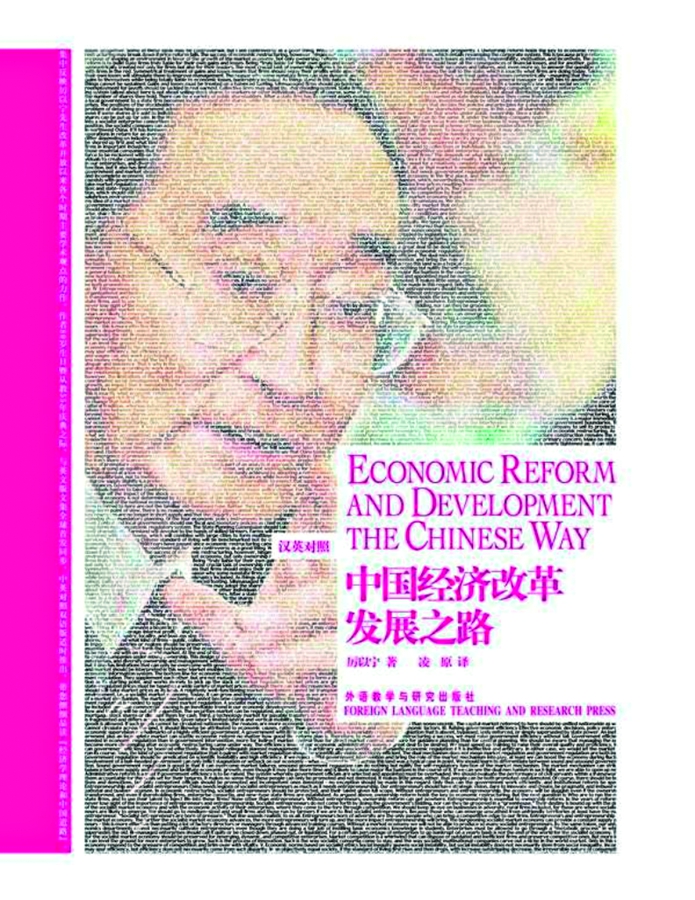By staff reporter ZHOU LIN

Economic Reform and Development – The Chinese Way
Author: Li Yining
Translator: Ling Yuan
Price: RMB 80
Published by Foreign Language Teaching and Research Press
By staff reporter ZHOU LIN

Economic Reform and Development – The Chinese Way
Author: Li Yining
Translator: Ling Yuan
Price: RMB 80
Published by Foreign Language Teaching and Research Press
IN December 2017, at the symposium of “China’s Reform and Opening up” China’s ambassador to the Republic of Albania Jiang Yu recommended Economic Reform and Development – The Chinese Way written by renowned Chinese economist and historian Li Yining, and announced that the book had been published in Arabic. Ambassador Jiang noted that Professor Li is arguably one of the most significant figures in the realm of economics in China and his book has exerted an extensive and profound impact on China’s economic reform, which is a must read to understand the miracle of China’s reform and opening-up.
In 2010, the English version was published by the Foreign Language Teaching and Research Press, and two years later its international version was published by the Cambridge University Press. Reading the book in the new era can help both domestic and foreign readers as well as professionals deepen their understanding of how China has developed over the past 40 years.
In the early 1980s, the Chinese government began to enforce the reform and opening-up policy. Li’s book includes several papers he published from 1980 to 1998 which highlighted his academic thinking during that period.
This book embodies Li’s most representative economic views, which have and continue to have an intensive and profound impact on China’s economic reform. It is also inspiring for other countries facing the same challenge of economic transition.
The author profoundly explains some theoretical issues, such as China’s basic thoughts on economic restructuring; two types of disequilibrium and the main theme of China’s economic restructuring; the relationship between economic reform, economic growth, and industrial restructuring; and growth and fluctuations under economic disequilibrium.
Meanwhile, he prospectively discusses many realistic development problems in economic progress, for example, the role of education in economic growth, a tentative study on cultural economics, environmental protection and compensation to victims of environmental damage, coordinating economic development and environmental preservation in less developed regions, and property rights reform of rural enterprises.
Moreover, the author discusses fundamental economic problems, such as effective and rational investment under socialism, comparative economic history and the modernization of China, rationality and proportionality in income distribution, supplementing fiscal policy with monetary policy, and the dual foundations of efficiency.
Most of Li’s articles in the book are familiar to Chinese audiences, but for overseas scholars and students, it provides a new perspective.
Sun Laixiang, academician of the Academy of Social Sciences of the U.K., wrote a preface for the book. Former Chief Economist and senior Vice President of the World Bank Lin Yifu (Justin Yifu Lin) recommends the book, saying that Li Yining is one of the most influential economists since China began to transform from a planned economy to the market economy in 1979. As such, he believes the book has an acute analysis of major challenges in different stages of this transition with some policy proposals on how to handle these challenges. The book provides a unique perspective to know how Li speculates on, influences, and promotes China’s economic transformation.
Another academic referee is Qian Yingyi, dean of School of Economics and Management in the Tsinghua University and a professor of economics with the University of California, Berkeley. He agrees that Professor Li is one of the most influential economists in China and his research has exerted a great impact on China’s economic reform over the past four decades. The 16 papers collected in the book represent Li’s profound thought on China’s transformation and his innovative and pragmatic policy proposals, many of which have been adopted and put into practice. Therefore, readers who are concerned about China’s contemporary economy and its development process should check this book out.
This year marks the 40th anniversary of China’s reform and opening-up, which was a historical choice of contemporary China, bringing huge and profound changes to this country, as well as creating a new model for the modernization of human society. After 40 years of reform and opening-up, China has become the world’s second largest economy, biggest forex reserves holder, top goods trader, and largest manufacturing country. Chinese people’s living standard has greatly improved, and China is playing an increasingly important role in global governance. The positive spillover effect of its development achievements has become more pronounced.
As China’s President Xi Jinping said, “China’s reform and opening-up will never stop.” China will continue to push forward reform at deeper levels and in wider fields. It will also share its fruitful achievements with the world and join hands with all nations to build a better world.